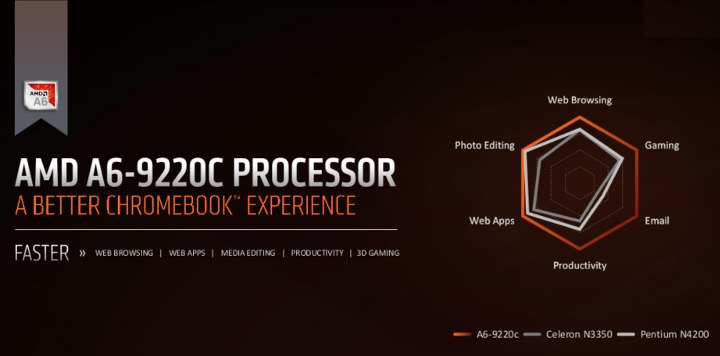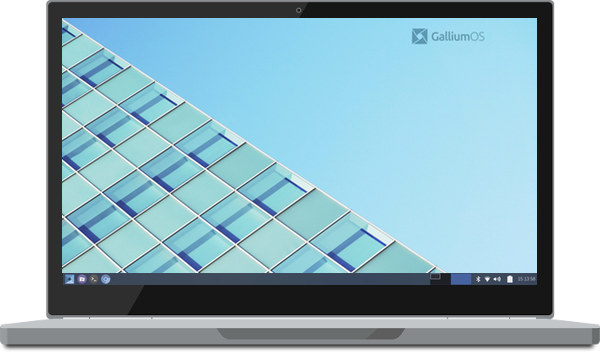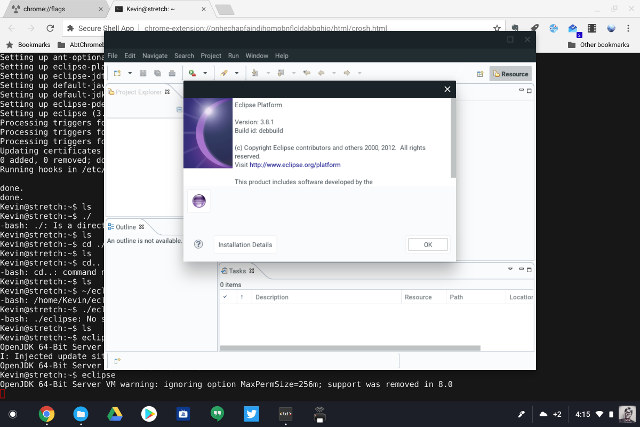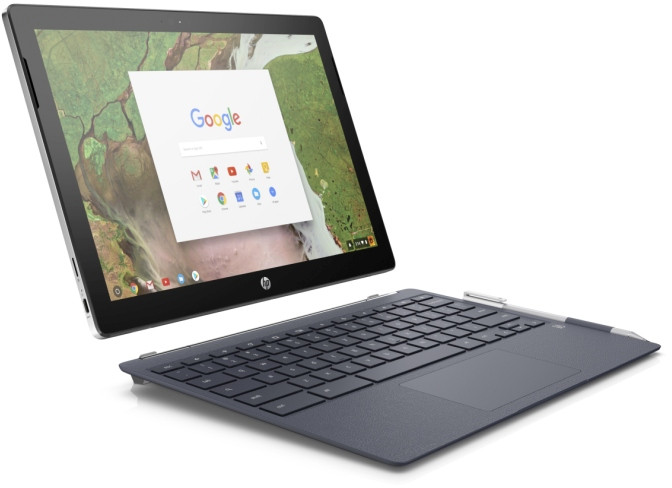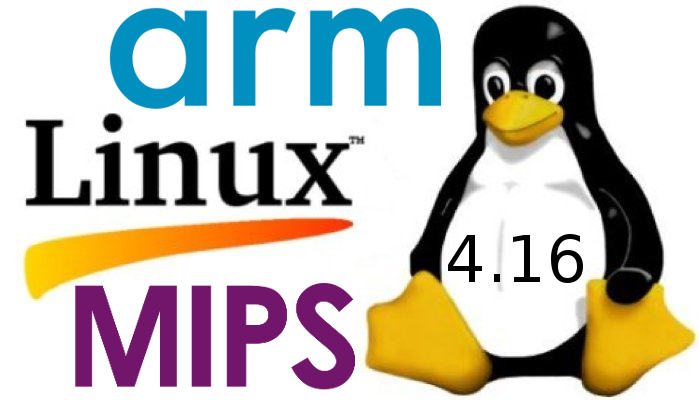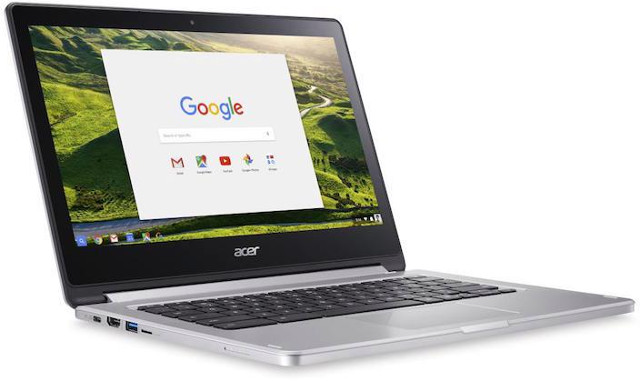Intel will usually release new low power processors under 10W TDP every year, but that has not been the case for AMD, with the company releasing several 12-15W processors in the recent past like Ryzen Embedded V1000 series and the Ryzen 7 2700U processor I’m currently using my Ubuntu laptop. However, AMD has now announced two new A-series processors with a 6W TDP, namely A4-9120C and A6-9220C dual-core processors that specifically target Chromebooks. AMD A4-9120C key features: Processor – 2x CPU cores, 2x CPU threads @ 1.6 GHz / 2.4 GHz (Boost) Cache – 160KB L1 cache, 1MB L2 cache GPU – Radeon R4 graphics with 3x GPU Cores up to 600 MHz, support for H.26x, VP9 decode Memory – Single channel @ 1866 MHz Video Output – HDMI and DisplayPort Process – 28nm CMOS Package – FT4 TDP – 6 watts AMD A6-9220C key features: Processor – 2x CPU […]
GalliumOS is a Linux Distribution for (Intel) Chromebooks & Chromeboxes
When I wrote about Crostini VM to run Linux apps on Chromebooks last week, I was informed about GalliumOS, described as a fast and lightweight Linux distro for ChromeOS devices – meaning Chromebooks and Chromeboxes – that is based on Xubuntu. Compared to ChromeOS, GalliumOS – and other Linux distributions – provides the ability to run more programs and more flexibility, and GalliumOS is said to deliver improved performance, longer battery life, better touchscreen support, etc.. compared to competing Linux distributions. You can go over the Download page to retrieve an image for your Chromebook or Chromebox, and either replace ChromeOS or go for a dual boot setup. The distribution does not support any Arm Chromebooks for now, and only works with some Intel devices with or without caveats depending on the model used. Check out the hardware compatibility matrix for details. The source code can be found on Github. […]
Run Linux Apps in (PixelBook) Chromebook with Crostini VM
Ever since the first Chromebooks were released, it has been possible to run Ubuntu or other Linux distributions using Crouton (Chromium OS Universal Chroot Environment) on Chrome OS devices, but that requires to enable developer mode, which disables some of security features that come with Chrome OS. Google has now make it easier and safer with Crostini VM that does not require developer mode. The only downsides for now are that it only works on Google Pixelbook, and you need to install/run Chrome OS v67 dev channel with the #enable-cros-container flag enabled. Using Crostini is fairly straightforward. First start crosh terminal with Ctrl++Atl+t, and running the following command to create a VM, and launch a container:
|
1 2 |
vmc start dev run_container.sh --container_name=stretch --user=<username> --shell |
This will start a Debian Stretch environment with networking and GUI support, so you can install & run programs like you would in Debian (e.g. apt install htop). Kevin Tofel at AboutChromebooks managed […]
HP Chromebook x2 is a 2-in-1 Tablet Running Chrome OS
We’ve recently seen what should be the first Chrome OS tablet with Acer Chromebook Tab featuring a Rockchip RK3399 / OP1 processor, and a 9.7″ display. The device is now joined by a high-end tablet, or more exactly a 2-in-1 tablet/ laptop with HP Chromebook x2. Specifications: SoC – Intel Core M3-7Y30 dual core/four thread processor @ 1.0 / 2.6 GHz with Intel HD Graphics 615 @ 300 / 615 MHz; 4.5W TDP System Memory – 4GB or 8GB LPDDR3-1600 RAM Storage -32GB eMMC flash, micro SD slot up to 256 GB Display – 12.3″ touchscreen display with 2400 x 1600 resolution; Camera – 13MP rear camera, 5MP front-facing camera/webcam Audio – Stereo speakers, dual microphones, headphone jack Connectivity – 802.11 ac 2×2 MIMO WiFi, Bluetooth 4.2 LE USB – 2x USB 3.0 type C ports User Input – Detachable island-style keyboard and an HP Active Pen for pressure-sensitive input. Battery […]
Linux 4.16 Release – Main Changes, Arm and MIPS Architectures
Linus Torvalds has just released Linux 4.16: So the take from final week of the 4.16 release looks a lot like rc7, in that about half of it is networking. If it wasn’t for that, it would all be very small and calm. We had a number of fixes and cleanups elsewhere, but none of it made me go “uhhuh, better let this soak for another week”. And davem didn’t think the networking was a reason to delay the release, so I’m not. End result: 4.16 is out, and the merge window for 4.17 is open and I’ll start doing pull requests tomorrow. Outside of networking, most of the last week was various arch fixlets (powerpc, arm, x86, arm64), some driver fixes (mainly scsi and rdma) and misc other noise (documentation, vm, perf). The appended shortlog gives an overview of the details (again, this is only the small stuff in […]
Acer Chromebook Tab 10 is the First Chrome OS Tablet
Chrome OS has been found in laptops (Chromebooks), and mini PCs (Chromeboxes) or even All-in-One PCs (Chromebases) for a while, but a new category has launched with Chrome OS tablets starting with Acer Chromebook Tab 10. The tablet is powered by a Rockchip RK3399 / OP1 processor, comes with 4GB RAM and 32GB storage, a 9.7″ display, supports Wacom EMR stylus, targets the education market. Acer Chromebook Tab 10 (D651N) specifications: SoC – Rockchip RK3399-C / OP1 hexa core processor with two Cortex A72 cores, four Cortex A53 cores, and a Mali-T860MP4 GPU System Memory – 4GB RAM Storage – 32GB eMMC flash, micro SD card slot Display – 9.7″ touchscreen IPS display with QXGA (2048×1536) resolution Audio – Headphone/speaker jack Connectivity – 802.11ac 2×2 MIMO WiFi, Bluetooth 4.2 Camera – 2MP front-facing camera USB – 1x USB 3.1 Gen 1 Type C port for charging, data transfer and connection […]
Imagination Releases PowerVR CLDNN Neural Network SDK and Image for Acer Chromebook R13
Last month, Imagination Technology released their PowerVR CLDNN SDK, an AI-oriented API that leverages OpenCL support in PowerVR GX6250 GPU in order to create network layers for constructing and running a neural network on PowerVR hardware. Eventually the SDK will support PowerVR Series2NX Neural Network Accelerator, but while waiting for the hardware, the company has provided a firmware that runs only on Mediatek MT8173 based Acer Chromebook R13. The SDK includes a demo taking a live camera feed to identify the object(s) the camera is pointing at, using known network models such as AlexNet, GoogLeNet, VGG-16, or SqueezeNet. All models are Caffe models trained against the ImageNet dataset, a benchmark function is included within the demo. Beside simply playing with the demos, you’ll be able to study the source code to check out various helper functions such as file loading, dynamic library initialisation and OpenCL context management, and read documentation such as the PowerVR CLDNN reference […]
Linux 4.12 Release – Main Changes, ARM & MIPS Architectures
Linus Torvalds has just released Linux 4.12: Things were quite calm this week, so I really didn’t have any real reason to delay the 4.12 release. As mentioned over the various rc announcements, 4.12 is one of the bigger releases historically, and I think only 4.9 ends up having had more commits. And 4.9 was big at least partly because Greg announced it was an LTS kernel. But 4.12 is just plain big. There’s also nothing particularly odd going on in the tree – it’s all just normal development, just more of it that usual. The shortlog below is obviously just the minor changes since rc7 – the whole 4.12 shortlog is much too large to post. In the diff department, 4.12 is also very big, although the reason there isn’t just that there’s a lot of development, we have the added bulk of a lot of new header files […]


